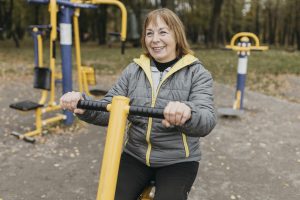As the weather grows colder, nature slows down—trees go dormant, days get shorter, and many animals will hunker down to hibernate. You may notice this shift in yourself, too. With less exposure to sunlight, your internal clock can be thrown off and leave you feeling tired and sluggish, which in turn can leave you less motivated to get out and do things. However, staying social is just as important in the winter months, if not even more so.
The Importance of Staying Social
According to the Cleveland Clinic, loneliness is “one of the most recognized contributors to mental health issues”. It has been associated with elevated risks for depression, anxiety, and general stress, as well as cognitive disorders such as Alzheimer’s; frequent social contact is thought to reduce the risk of dementia, which is particularly noteworthy for older adults. As you age, the risk of developing these cognitive disorders is greatly heightened. Staying socially active may prevent some of these disorders, or at least alleviate some of their symptoms.
In addition to this, loneliness can impact physical health; studies have shown effects on blood pressure and cholesterol levels, which in turn can increase risks of strokes and heart attacks—which are most common in older adults. And while social isolation is a concern year-round, it usually impacts you most in the wintertime, with shorter daylight hours and unfavorable weather conditions exacerbating its negative effects.
Elevated risks of seasonal illnesses, such as the flu, can also create difficulty in making plans—causing further social isolation. With icy weather and lower temperatures, fears of falling and hypothermia can also cause many older adults to avoid making plans to go out. It’s a vicious cycle which can be very challenging to overcome. That being said, having a social winter is still achievable! You just need to approach it in the right way.
General Tips for Winter
After learning the benefits of socialization, it’s likely that you want to start getting out more. That’s fantastic! In order to properly reap the rewards, it’s important to understand the challenges that come along with both the winter conditions and with your age, as this season often affects older adults most.
Prepare for the Cold
While you may have gotten away with skimpy clothes in your teens, it’s best to avoid getting cold as an older adult. As an older adult, you are more likely to develop hypothermia, which can cause damage to the heart, kidneys, and brain—and if untreated, hypothermia can be fatal. If you are going out in cold weather, be sure to take the necessary precautions to keep warm.
To prevent hypothermia while outdoors, always dress in multiple layers and wear hats, mittens, and scarves. Keeping your body insulated and protected from both wind and moisture is very important! Avoiding caffeinated and alcoholic beverages can also help, as these can actually increase the rate of body heat loss. Instead of drinking these, consider bringing a warm drink like tea or hot cocoa with you in a thermos or other insulated bottle. That way, if you begin to feel cold, you will have a quick way to warm up. Alongside staying well hydrated, make sure that you are well fed before and while you are out. Much like an actual heater, your body needs fuel to generate heat, so providing it with good hearty foods can make a big difference.
On top of this, be sure to plan ahead before going out. Try searching for cafes or community centers near where you are planning to go. Should the weather take a turn, it’s a good idea to have several places where you could go and warm up, or wait out a storm.
Even if you are indoors, staying warm is just as important. Be sure to stay well fed, as mentioned above, and ensure that your thermostat is set high enough—one JAMA Network article recommended setting it to 68°F or higher. Keeping windows and doors closed and minimizing drafts can also help to keep you warm without elevating heating costs.
Avoid Slips and Falls
One of the most common fears in older adults is a fear of falls—this may be something that you share. If that is the case, winter’s icy surfaces can be especially nerve-wracking. There are several things that you can do to lower your risks of falling.
First, plan ahead and don’t go out if the conditions are bad. After freezing rain or flash freezes, it is best to stay indoors. If you do go out when conditions are icy, be sure to let people know where you are going, and bring an alert system—like a phone or whistle—to call for help if needed. Wearing rubber-soled boots and shoes with a flat shape (i.e. no high heels), as well as using ice grips can help to increase traction further. However, take care to still avoid icy surfaces whenever possible—these devices are not foolproof! Removing ice grips right after going indoors is also important, as they can cause damage and result in slips on indoor flooring.
When walking, take smaller steps and keep your hands out of your pockets. Having your hands in your pockets may be warm, but having them out improves your balance and will let you catch yourself if you do end up slipping. This video from the Alberta Health Services explains how to “walk like a penguin” to lower the risk of falling. And of course, choose where you walk carefully. Avoid dark or wet areas, and try to walk on cleared pathways whenever possible.
Take Measures to Prevent Illness
As the weather grows colder, seasonal illnesses like the flu become much more common. This is for a number of reasons; colder temperatures can actually make it easier for the viruses to survive. Winter’s dry air also plays a role in these increased contagion rates. As explained in this Mayo Clinic article, in humid air sickness particles can join with water particles and become bigger and heavier—this causes them to fall to the ground. Dry air does the opposite. Since there are less water particles to join with, viral particles are able to stay airborne for longer. And, since people spend more time indoors, you are more likely to come into contact with these particles than in the warmer months.
In order to lower the risks of catching these illnesses, you can do several things. First and foremost, get vaccinated! Vaccinations work by exposing your body to weakened or inactive parts of the virus, which then teaches your body how to fight it later on. For those aged 65 and older, your doctor may recommend a specific kind of vaccine which is better suited to older adults; for example, the CDC recommends that adults over 65 years get a higher-dose or adjuvanted flu vaccine to maximize benefits. It is also possible in some cases to have vaccinations covered by Medicare.
Along with getting vaccinated, wearing masks while out in public spaces can reduce your exposure to viruses. From cloth masks to professional grade N95 masks, there are many options out there, but anything is better than nothing! Try to find something that you are comfortable with wearing and stick with wearing it whenever you go to an indoor public space.
Ideas for Wintertime Activities
Now that you are all bundled up, have checked the weather, and are protected against sickness, you can finally get out and have fun! In fact, you may already have plans, such as holiday dinners with family, or events to go to with friends. In case you are looking for more inspiration, we have listed several ideas below. These are listed in order from highest to lowest effort, as we know that some days are more energy-filled than others. This ranking is just a guide, and you may find some of the “low effort” activities to be difficult—always make sure to check in with yourself and your abilities for the day.
Check Out Winter Festivals and Markets
Visiting a winter market or festival can be a great way to get into the holiday spirit. Whether you celebrate Christmas, Hanukkah, Diwali, Kwanzaa, or simply like to treat your loved ones, there are many opportunities to pick up gifts for your special people.
Festivals don’t have to be about gift-getting either. Many times, winter festivals will have performances—think parades, music, and ice sculpture shows—as well as competitions to participate in, should you be interested. Simply going to experience the sights and try the delicious warm treats is also an option!
As winter festivals have a wide variety of activities, they can be great places to go with family and friends. No matter how old or young, there is something for everyone to enjoy. You can let your grandchildren get their energy out while catching up with your kids over some hot cocoa, or enjoy some beautiful ice sculptures with your neighbours and friends. Just make sure to dress warmly, and to not be afraid to move somewhere indoors if you start feeling chilly.
Get Some Exercise (Both Indoors and Outdoors)
It is always important to stay physically active, and winter is no exception! As per the Centers for Disease Prevention and Control, adults aged 65 and older are recommended to get at least 150 minutes of moderately intense exercise a week. Exercising is not only good for you physically, but can also be great for socializing. By bringing a friend with you or joining a group, you’ll be able to get the best of both worlds.
Though the roads may be a bit treacherous, there are still many ways to exercise safely outdoors. For those of you with high mobility and energy, snowshoeing is a great way to get moving. It is a lot more tiring than regular walking, so be sure to keep things short and slow to start; you can rent snowshoes for the first few times, and then consider buying your own pair if you feel that it’s a sustainable activity for you. Other high energy options include skating and skiing. If you have lower energy or have mobility issues, simply taking a walk outside is still highly beneficial. Just be sure to choose your routes carefully to avoid icy or uncleared roads. For each of these, consider joining a group—walking groups are especially popular for older adults—or organize your own! You could organize a trip out to a local cafe, so that you have a warm destination to warm up in before heading back home.
If the weather is particularly bad, going to an indoor exercise class for something like yoga, tai chi, or aquatic fitness can help to keep you social and fit. If you have a walking group who you usually walk with, you could also try walking through a local mall. That way, you will be warm and still get to exercise and chat!
When exercising in the winter, it is also important to note that, while you may feel warm while you’re moving, you can cool off very quickly. Always dress warmly, and wear sweat-wicking layers to minimize heat loss.
Attend Indoor Events
If you just don’t feel like staying out in the cold, consider checking out some local indoor events. Many community centers will offer older adult-specific crafting events for holiday decorations, which provide fantastic opportunities to both engage your mind and meet new people. According to numerous studies, including an analysis by Sage Journals, crafting has been shown to enrich older adult life and improve mental health. And, by creating something with others, you can not only make beautiful decorations, but also create memories and friendships that will last for the rest of your life.
The festive season also often comes with a wide range of concerts, from christmas choirs to holiday rock. If you or your loved ones are music enthusiasts, consider buying some tickets to see a show! If you enjoy singing, you could also participate in events like Scratch Messiah, where the audience becomes the choir—no rehearsals, just the pure joy of singing with others.
If you’re someone who likes to stick with what they know best, joining a club centered around one of your existing hobbies can connect you with likeminded people. Try joining a knit-and-natter club to swap patterns and stories, or attend a book club meeting to discuss your most recent reads. With the internet, it has never been easier to connect with others; using sites like Facebook and Meetup, you’ll be able to search for exactly what you’re looking for.
Go Virtual
On some days it may simply be too difficult to go outside, whether that be due to road conditions, frigid temperatures, or low energy. In these cases, virtual events can connect you to others from the comfort of your own home. Some examples include virtual book clubs, talks or presentations, exercise classes, and much more. While using tech can be daunting, with the right help—for example, asking your family to help get you started—and lots of practice, you’ll be able to attend virtual events in no time.
Connecting with family and friends over long distances is also now easier than ever. If you have friends living abroad, or live in a remote area away from your loved ones, try setting up weekly or biweekly calls—with video, or just audio—to catch up on their lives. This can also be a great way to practice using technology!
Final Remarks
In this article, we have mentioned several strategies in both staying healthy through the winter, and keeping socially active. However, if you are struggling with intense feelings of loneliness, fatigue, and sadness, you may be experiencing depression, and the strategies listed above are not replacements for professional help. Talking to someone in your family, friend group, or reaching out to a doctor or therapist can help. Remember—even though it may be hard to see it, there is hope. Help is available. You don’t need to suffer alone.









